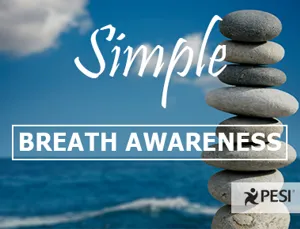Simple Breath Awareness: An exercise to fight stress, anxiety and insomnia

Dr. Daniel Siegel, pioneer in Interpersonal Neurobiology, maintains that just being aware of the breath helps the brain to regulate and organize itself, promoting integration and increasing the thickness of the myelin sheath. In an unintegrated brain, a person has an option of either having a chaotic or rigid brain process, with nothing in between.
He writes on his website...
The following practice worked well for my client, Sue, who had difficulty focusing her thoughts and trouble falling asleep. After learning this practice, she was able to practice breath awareness on her own at home and eventually eliminated her dependence on sleeping medication.
Use this script with your clients, and remember to practice it yourself to learn first-hand about the benefits.
This blog was brought to life by PESI speaker Joann Lutz. She has been training mental health professionals to bring trauma-informed yoga into their healing work nationally and internationally for the past six years, bringing this work to universities, conferences, hospitals, ashrams and yoga centers.
He writes on his website...
For the brain, integration means that separated areas with their unique functions, in the skull and throughout the body, become linked to each other through synaptic connections. These integrated linkages enable more intricate functions to emerge—such as insight, empathy, intuition, and morality. A result of integration is kindness, resilience, and health.You can use this simple breath awareness exercise from the classic text, “The Yoga Sutras of Patanjali," in a therapy session to help the client direct their attention to internal states and balance their autonomic nervous system.
The following practice worked well for my client, Sue, who had difficulty focusing her thoughts and trouble falling asleep. After learning this practice, she was able to practice breath awareness on her own at home and eventually eliminated her dependence on sleeping medication.
Use this script with your clients, and remember to practice it yourself to learn first-hand about the benefits.
Start by focusing on the place in your body where you can hear your breath.
(Pause for one minute)
Now, notice any movement of your body as you breathe.
(Pause)
Next, feel the breath as it enters and leaves the nostrils, so your entire awareness becomes focused on the nostrils.
(Pause)
How do you feel? Do you notice a difference between how you felt before the breath awareness exercises and how you feel now?
Remember clients are not instructed to change their breathing pattern at all, although it may change spontaneously as the practice continues.
This blog was brought to life by PESI speaker Joann Lutz. She has been training mental health professionals to bring trauma-informed yoga into their healing work nationally and internationally for the past six years, bringing this work to universities, conferences, hospitals, ashrams and yoga centers.




